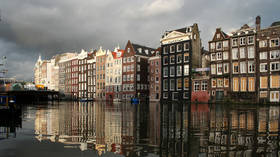EU country slides into recession – data

The Dutch economy has entered a recession after falling for two consecutive quarters, Statistics Netherlands (CBS) revealed on Wednesday.
The Eurozone’s fifth largest economy shrank 0.3% quarterly between April and June, after a 0.4% contraction in the first three months of the year.
The Netherlands is facing its first recession since the pandemic, driven by weak exports and lower household consumption, as surging inflation pushed up food prices and energy bills, according to CBS. Dutch economic growth reached almost 5% per year in 2021 and 2022 in a quick recovery from the Covid-19 crisis.
“The Dutch contraction of 0.3% is striking compared to the economic development in neighboring countries. In France and Belgium, the economy grew by 0.5% and 0.2% respectively in the second quarter of 2023 compared to the previous quarter,” CBS said.
Exports of goods and services dropped by 0.7% quarter-to-quarter in the three months through June, data shows.
“As a result, the trade balance made the most negative contribution to the contraction in the second quarter,” CBS noted.
Labor shortages and a slump in demand from EU partners, along with steep rises in interest rates also contributed to the economic downturn.
“Stability and predictability are now needed, so we have to be careful not to disrupt the economy and also to increase taxes,” Economic Affairs Minister Micky Adriaansens told Dutch news agency ANP.
Domestic consumption fell 1.6% in the Netherlands, while government spending advanced by 0.7%.
Over half of Dutch industries saw a slump in added value in the second quarter of the year compared to the first, with the most substantial decline in mineral extraction, statistics show.
The Netherlands is the second major EU economy to enter a recession. The German economy contracted in two consecutive quarters earlier this year.
For more stories on economy & finance visit RT's business section













